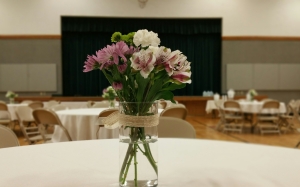What do you say to someone who’s mourning during the holidays? If your friends’ loss is recent, wishing them “happy holidays” — or happy anything from Thanksgiving through New Year’s Day — might come across as if you don’t realize (or care about) the permanence of their grief. On the other hand, saying nothing at all speaks a louder message of indifference than shouted words.

Like the scent of candles, grief remains in the air of the holidays even amid the beauty and joys of the season (photo by Teresa TL Bruce, TealAshes.com).
Saying something is better than saying nothing. Here are ways to tell your friends you’re thinking of them and aware of their grief during the holidays:
- “I’m thinking of you. I know this is your first Thanksgiving without [say the name of the person who died].”
- “I’m keeping you and your family in my thoughts this second Hanukkah after [say the name]’s death. I realize you’re still adjusting to [his/her] absence.”
- “Will you join us for Christmas Eve services? We realize you might not want to sit alone.”
- “I’ve brought you this token as a symbol of [one of the seven principles] to share with you this first week of Kwanzaa without [say the name].”
- “I know this New Year’s Eve will be hard without [say the name of the deceased] here with you.”
- “Will you please join me for this holiday?”
- “May I come visit with you during this holiday?”
- “I’d love to hear stories about [say the name of the lost loved one].”
Did it seem odd that I repeated the admonition to say the name of the deceased? Most mourners need to process their losses by talking of their departed loved ones. Too often, well-meaning friends think they’ll “make” their friends sad if they mention the names of the ones being mourned. The reality is they’re already sad and would rather have others acknowledge their loss instead of pretending it didn’t happen. Remember, grief is a natural outgrowth of love.
Well-thought words can soothe wounded hearts. (Notice I said “soothe” and not “heal”? You can’t “fix” anyone’s grief, but you can offer consoling support that doesn’t deepen pain.) When talking about the holidays with the newly bereaved, be thoughtful and deliberate in your choices of words:
- Plan to commemorate instead of celebrate.
- Invite grieving friends to a gathering rather than a party.
- Acknowledge awareness of your friends’ ongoing grief rather than assuming they should already feel or do anything expected by others.
- Avoid “at least” statements, which diminish the importance and impact of mourners’ losses.
There’s no good time of year to grieve, but the holidays can be especially difficult. Whether death takes place in the middle of the busiest holidays or in the least-scheduled month of a family (or corporate) calendar, it’s going to hurt. And it’s going to hurt not just now, when the loss is new, but also in the weeks and months and years to come. (Yes, I said years.)
Holiday traditions and expectations sometimes fan the embers of grief back into flames. You can’t restore what grief’s flames damage, but you can offer the balm of kindness and understanding as your mourning friends’ adapt to their altered lives.




